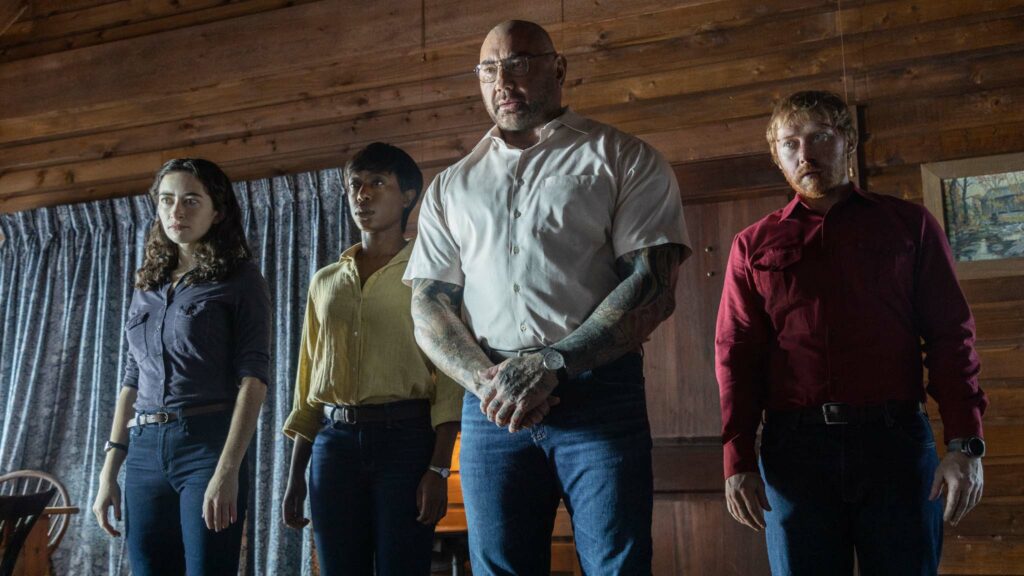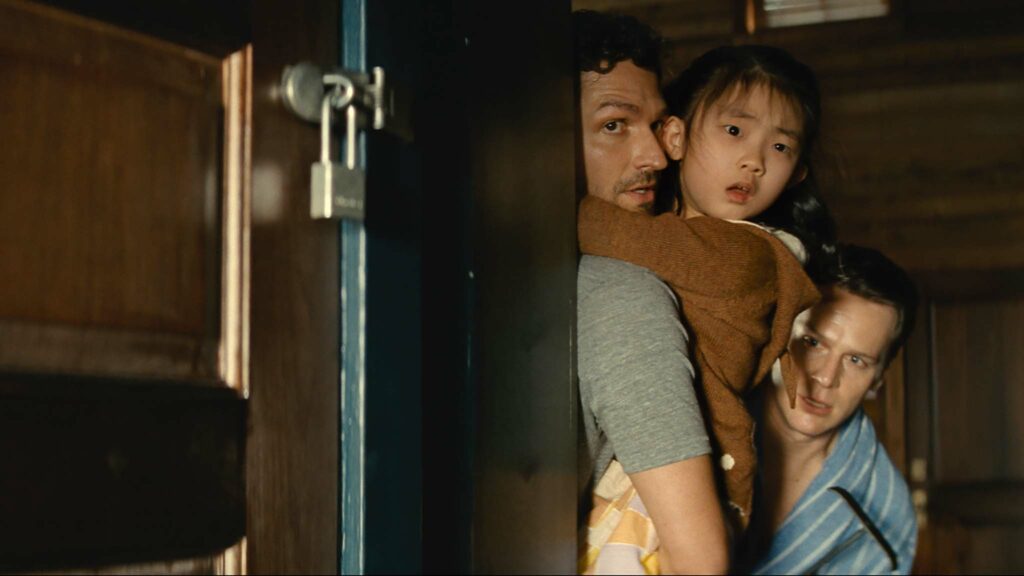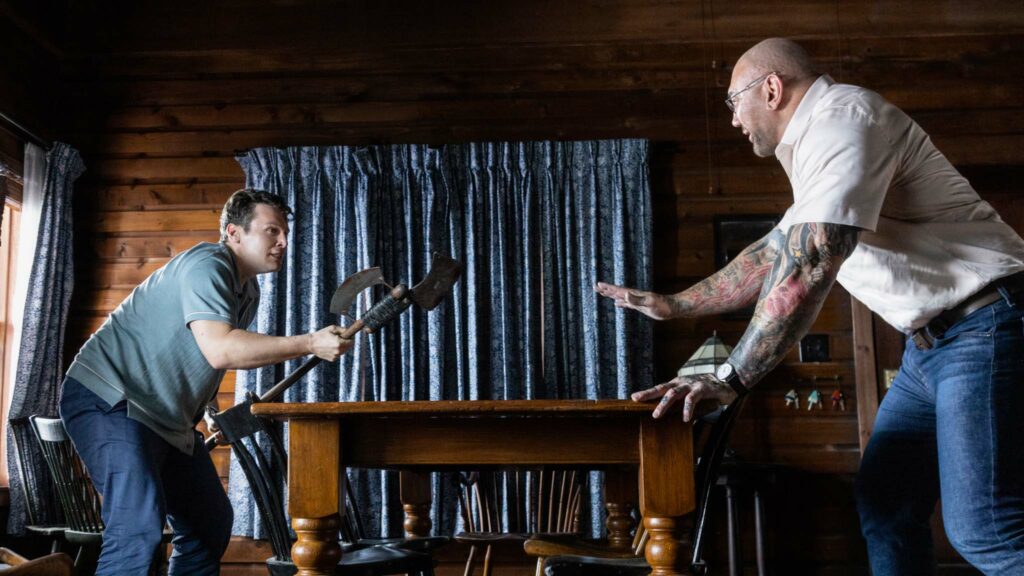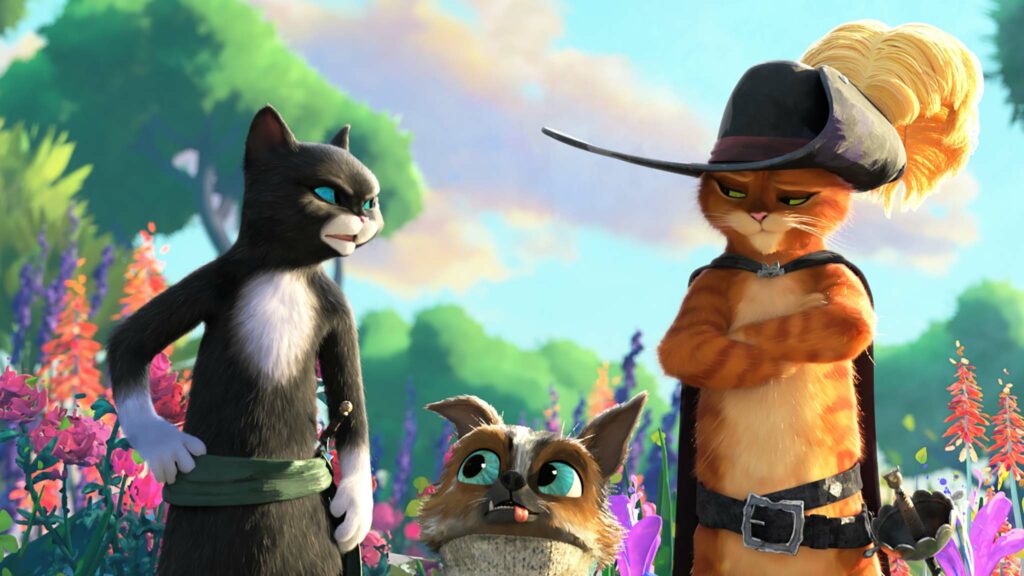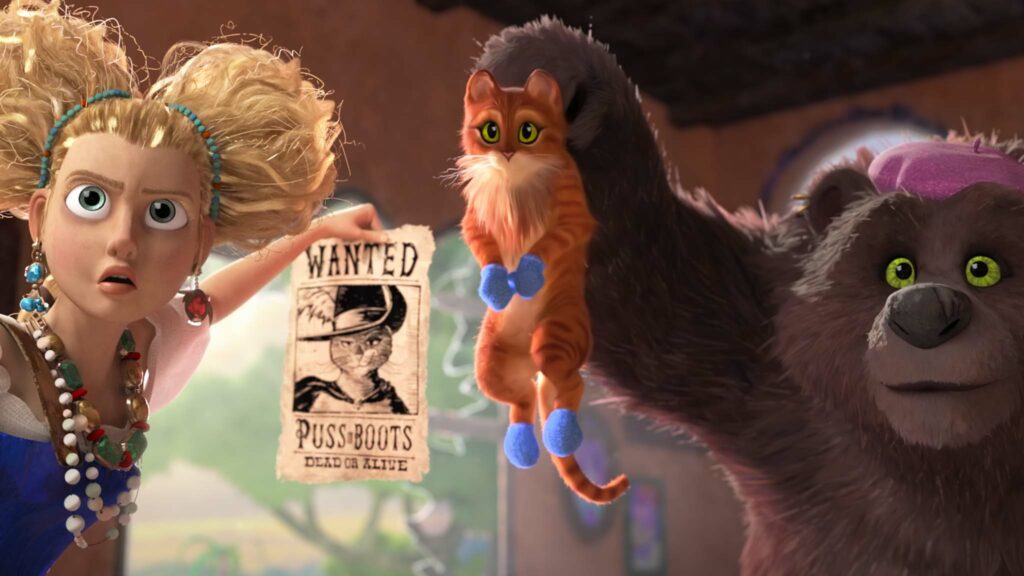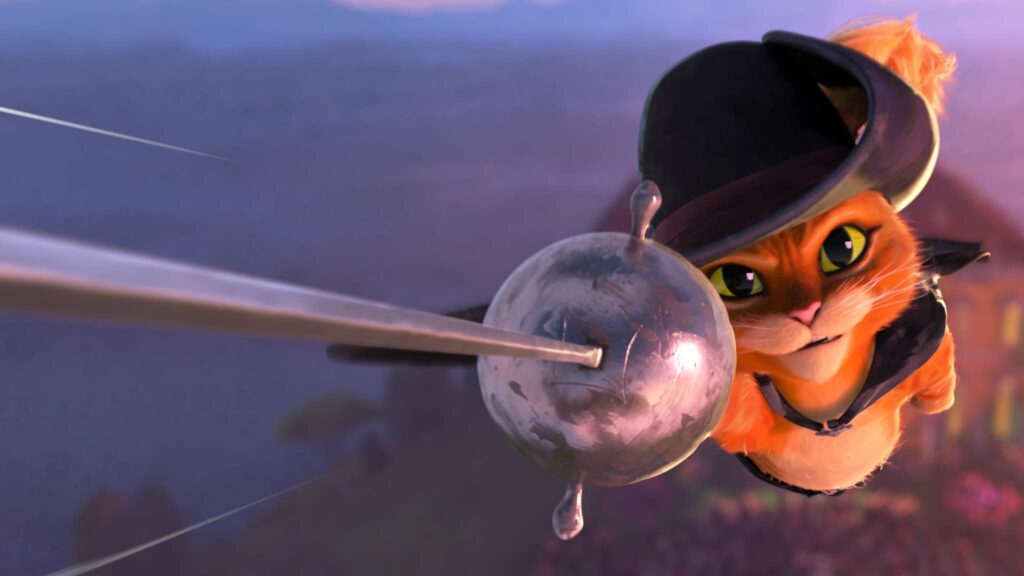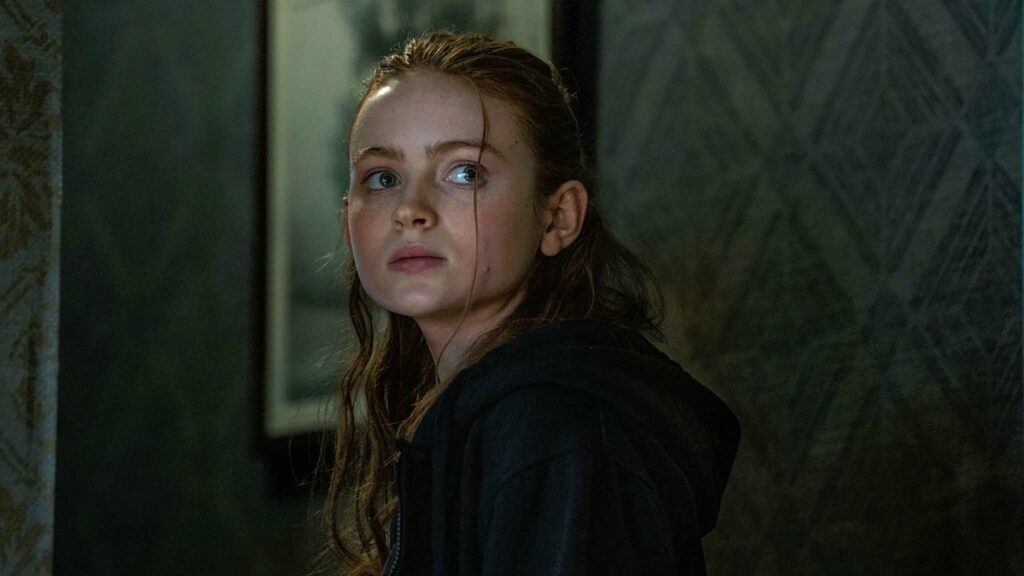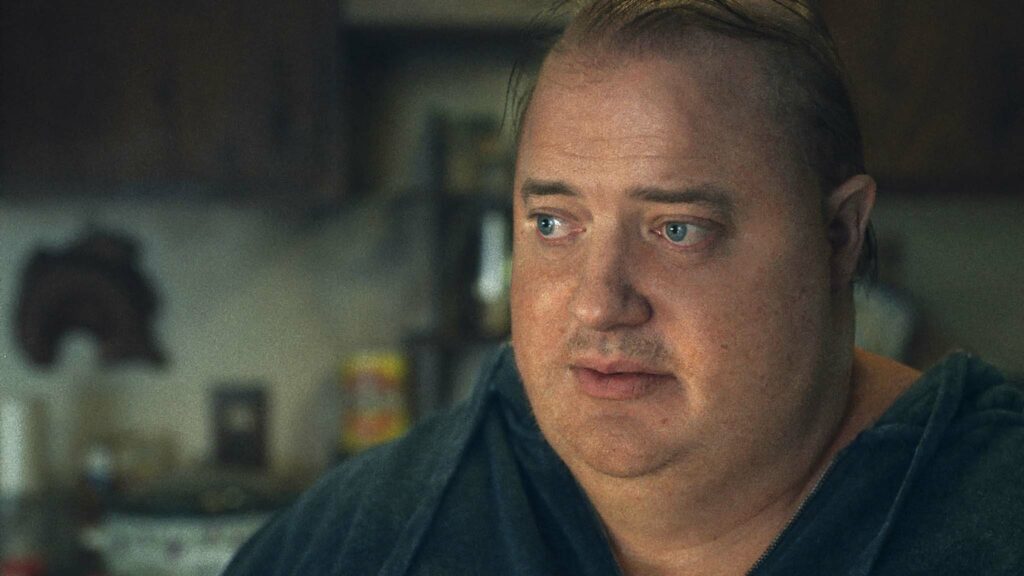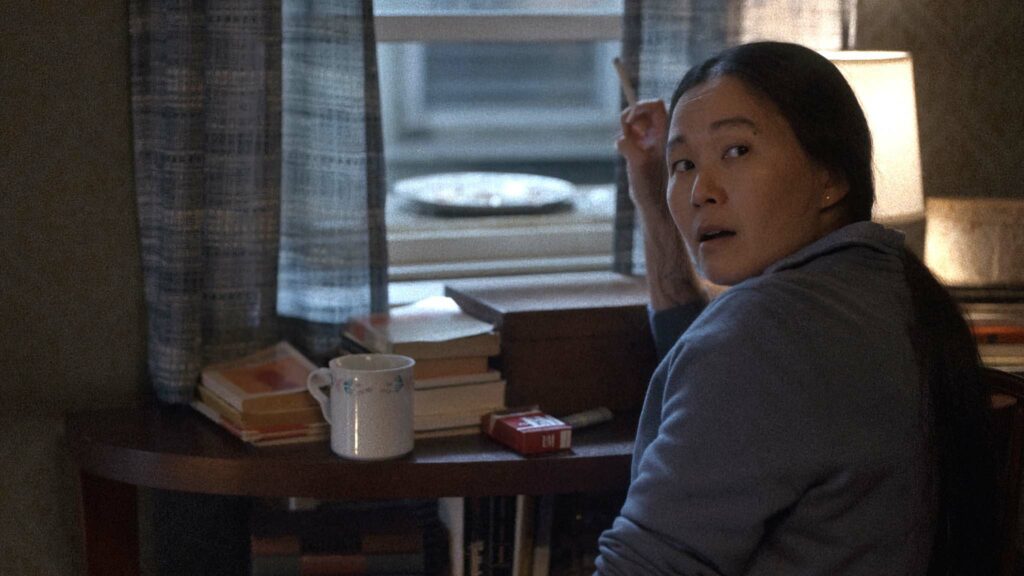Horror
Knock At The Cabin (15)
Review: We are active participants in our personal stories, creating chain reactions of choices and consequences with the potential to cause ripples outside our own experience. Get up or stay in bed, work or play, forgive or begrudge, compromise or stubbornly resist, sink or swim. Adapted from Paul Tremblay’s award-winning novel, The Cabin At The End Of The World, director M Night Shyamalan’s gnarly psychological thriller presents a same-sex family with an impossible moral dilemma: save each other or the entire human race. The film’s principal setting (a cabin in a communications blackspot) is intentionally claustrophobic and allows Shyamalan to slowly crank up tension by limiting access to verifiable proof that the tall tale being spun is true.
Sporadic flashbacks add daubs of colour – a vicious assault that lights the fuse on one man’s simmering rage, a joyful first encounter with a surrogate daughter as an infant, an awkward lunch date with one set of disapproving parents – but character development is largely limited to the here and now, restricting our emotional attachment to the chosen family. Powerful and compelling performances from Jonathan Groff and Ben Aldridge as spouses in peril tug heartstrings and Shyamalan avoids the introduction of one of his gimmicky last-gasp twists to an original draft of the screenplay by Steve Desmond and Michael Sherman.
Eric (Groff), his husband Andrew (Aldridge) and their adopted seven-year-old daughter Wen (Kristen Cui) head to a cabin in the woods. The secluded location silences the disruptive chatter of texts, emails and social media, allowing Wren to convene with nature while her parents savour quality time on the patio. Tranquillity is shattered by the arrival of four strangers, Leonard (Dave Bautista), Sabrina (Nikki Amuka-Bird), Redmond (Rupert Grint) and Adriane (Abby Quinn). The interlopers are armed with crude, homemade weapons and forcibly break into the cabin as Eric and Andrew protect their only child.
After a tense stand-off, the intruders tie the two fathers to chairs and reveal their shared purpose. “It might be the most important job in the history of the world,” enigmatically discloses Leonard. The quartet have been summoned by shared visions of impending catastrophe and present Eric and Andrew with a horrifying decision. “If you fail to choose, the world will end,” explains Leonard.
Knock At The Cabin begins with a joyful burst of KC And The Sunshine Band’s 1975 dancefloor groove Boogie Shoes then turns down the volume on external interruptions to the ill-fated family retreat. Suspense is comfortably sustained across the 100-minute running time. An agonising ‘what if’ scenario, translated from Tremblay’s book, provides plentiful food for thought after end credits roll. In terms of Shyamalan’s picture, the decision and its ramifications are more fascinating than the protagonists under duress.
Find Knock At The Cabin in the cinemas
Animation
Puss In Boots: The Last Wish (PG)
Review: Curiosity revives the cat in a rumbustious computer-animated sequel, which compels the eponymous feline from the Shrek franchise to temporarily sheath his sword and meditate on his mortality as he expends all but one of his cherished nine lives. Screenwriters Paul Fisher and Tommy Swerdlow tread lightly but purposefully through the title character’s existential crisis, furnishing Antonio Banderas with lines of heartfelt dialogue that question the value of a legacy when you leave no room for anyone to share those precious moments.
Puss In Boots: The Last Wish is surprisingly touching and thoughtful, repeatedly underlining the enduring power of biological and chosen families in between frequent chortles like when Salma Hayek Pinault’s jilted love interest issues a swingeing verdict on Puss’s unkempt facial hair: “It’s like a possum crawled on your face and died”. Director Joel Crawford and co-director Januel Mercado enthusiastically plunder literature and popular culture throughout their gung-ho escapade, striking a pleasing balance between visual spectacle to engage young audiences and wry in-jokery for older children and adults. They orchestrate visually stylish action sequences including a thrilling battle with a rampaging giant that is breathlessly choreographed to the paw-tapping original song Fearless Hero performed by Banderas and composer Heitor Pereira.
When we encounter sword-wielding outlaw Puss In Boots (voiced by Banderas), he is too busy swashing buckles and proudly polishing his reputation as The Stabby Tabby to notice that he has used up eight of his allocated nine lives. “My prescription… you need to retire,” advises a kindly doctor (Anthony Mendez), who directs the crestfallen feline to a crowded cat rescue home run by Mama Luna (Da’Vine Joy Randolph).
Goldilocks (Florence Pugh) and her surrogate clan, the Three Bears Crime Family comprising Mama Bear (Olivia Colman), Papa Bear (Ray Winstone) and Baby Bear (Samson Kayo), invade Mama Luna’s refuge and remind Puss of the legend of a single wish waiting to be granted deep within the Dark Forest. Puss embarks on an epic quest to locate the fabled Wishing Star in the company of alluring pickpocket Kitty Softpaws (Hayek Pinault) and lovable stray dog Perrito (Harvey Guillen). En route, the furry adventurers face a bounty hunting big bad Wolf (Wagner Moura) and tyrannical pastry chef “Big” Jack Horner (John Mulaney), who intends to possess all magic in the world.
Puss In Boots: The Last Wish is a satisfying slink through fairy tale tropes that purrs most sweetly when characters affirm core values of teamwork, self-sacrifice and resilience. Storybook animation in a painterly style harks back to the original Shrek but also sets this feline fantasy apart. Composer Pereira’s energetic score matches the brisk tempo of Crawford and Mercado’s direction, while Guillen’s embodiment of wholesome childlike naivete a la Olaf in Frozen almost upstages Banderas and Hayek Pinault’s romantic double-act.
Find Puss In Boots: The Last Wish in the cinemas
Drama
The Whale (15)
Review: In Herman Melville’s 19th-century sea-faring adventure Moby-Dick; Or, The Whale, which features heavily in Darren Aronofsky’s claustrophobic character study adapted by Samuel D Hunter from his 2012 off-Broadway stage play, the narrator – a sailor called Ishmael – loses patience with the rambling of a shabbily dressed stranger. “Look here, friend, if you have anything important to tell us, out with it,” Ishmael implores sternly. Alas, Hunter and his principal character – a morbidly obese creative writing professor resigned to death from congestive heart failure – ignore the plea and prolong the self-inflicted misery for almost two hours.
Aronofsky’s bloated film would be hard to stomach without effervescent performances from an ensemble cast led by a revelatory, career-best turn from Brendan Fraser as the wheezing educator. Complemented by Oscar-nominated prosthetics and special make-up, Fraser’s portrayal of grief-fuelled self-destruction and loathing would have both hands firmly on the Academy Award in a subtler and nimbler translation from stage to screen. With a tear-filled glance, the rejuvenated actor skilfully guides us through inner turmoil and despair towards the soothing light of forgiveness. Aronofsky’s bold decision to remain almost entirely within the lead character’s home, and to seldom stray outside for fresh air, intensifies feelings of stagnation and suffocation but also underlines the film’s theatrical origins.
Nineteen-year-old door-to-door Christian missionary Thomas (Ty Simpkins) unwittingly blunders into a medical emergency in a nondescript two-bedroom apartment in northern Idaho. Gay college lecturer Charlie (Fraser), who weighs about 600 pounds (42-plus stone), is in the throes of cardiac arrest. Charlie refuses an ambulance – he doesn’t have medical insurance – and summons best friend and nurse Liz (Hong Chau) instead. “Being in debt is better than being dead,” she angrily quips, recording his dangerously high blood pressure.
Over the course of a week, Thomas witnesses Charlie awkwardly rebuilding burnt bridges to his estranged teenage daughter Ellie (Sadie Sink) and verbally sparring with Liz, who vociferously disapproves of his tactics. “You haven’t seen her since she was eight years old and you want to reconnect with her by doing her homework?” despairs the nurse. As Charlie’s condition worsens, Ellie exploits the situation and her acid-tongued mother (Samantha Morton) pays an unexpected visit to the man who wrecked their marriage by having an affair with a male student.
The Whale takes a sledgehammer approach to delivering emotional blows, exemplified by stomach-churning scenes of Fraser gorging on pizza, candy bars and buckets of fried chicken to hasten Charlie’s choking demise. His mesmerising, layered performance is matched by Chau, who was lip-smackingly delicious in The Menu last year and shows the same steely edge here with glimmers of heartrending vulnerability. “I was always big but I just let it get out of control,” Charlie tells daughter Ellie during one heated exchange. The same fate befalls Aronofsky’s picture.
Find The Whale in the cinemas


